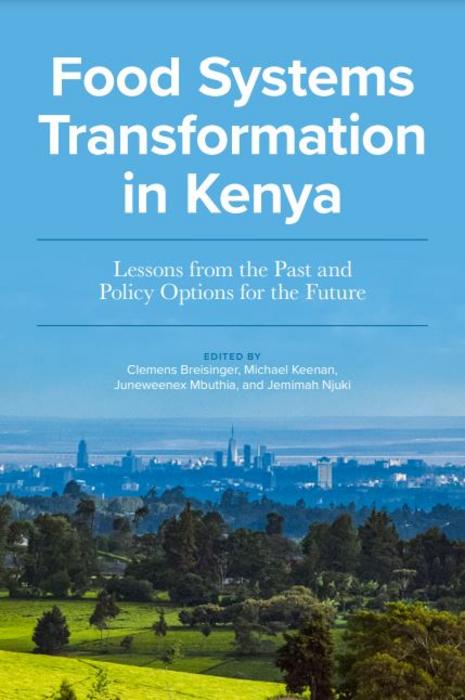The past few years have seen Kenya, along with many other countries, confronted with multifaceted and compounding challenges. The disruptions caused by COVID-19, high levels of food price inflation, and environmental crises, such as locust infestations and droughts, have severely tested the resilience of Kenya’s food systems and the affordability of food for its citizens. Against this backdrop of challenges and ongoing demographic shifts, urbanization, and stagnating agricultural production, the need for reexamining the approach to Kenyan food systems has never been more critical.

Credit: IFPRI
The past few years have seen Kenya, along with many other countries, confronted with multifaceted and compounding challenges. The disruptions caused by COVID-19, high levels of food price inflation, and environmental crises, such as locust infestations and droughts, have severely tested the resilience of Kenya’s food systems and the affordability of food for its citizens. Against this backdrop of challenges and ongoing demographic shifts, urbanization, and stagnating agricultural production, the need for reexamining the approach to Kenyan food systems has never been more critical.
A new IFPRI book Food Systems Transformation in Kenya: Lessons from the Past and Policy Options for the Future responds to this imperative by bringing together a wealth of empirical research on various aspects of Kenya’s food systems and offering a comprehensive overview of their historical trajectories and possibilities for future evolution. The book, edited by Clemens Breisinger, Michael Keenan, Juneweenex Mbuthia, and Jemimah Njuki, was launched on January 8, 2024, in Nairobi, Kenya, during a hybrid event co-organized by IFPRI, the International Livestock Research Institute (ILRI), Kenya’s Ministry of Agriculture and Livestock Development (MoALD), and the CGIAR Initiative on National Policies and Strategies.
The book takes a critical look at of the whole food system, including:
- The current state and drivers of transformation, in particular the country’s livestock sector and projections for its future.
- Ways to strengthen Kenyan food systems across several vital dimensions, such as promotion of healthier diets and food safety; enhanced productivity with greater intensification of the maize-based farming and improved access to agricultural inputs and mechanization; greater resilience through more widespread use of climate insurance and risk-contingent credit; improved livelihoods for women, youth, and smallholder farmers; and enhanced sustainability through postharvest management and digital tools.
Clemens Breisinger, the lead editor of the book, commented, “Kenya’s Government’s Bottom-Up Economic Transformation Agenda (BETA) prioritizes food systems, and this book offers actionable strategies aligned with the national goals. Mobilizing funding for food systems transformation is critical as is strengthening the science-policy interface to help Kenya meet the 2030 Sustainable Development Agenda. Despite the important role of the agri-food sector in Kenya’s economy, public expenditure in it remains low, hindering effective policy implementation. We hope that this book will serve as a guiding compass, offering a thorough exploration of the country’s food systems and presenting actionable recommendations to support positive change.”
Johan Swinnen, Director General of IFPRI and Managing Director, Systems Transformation, CGIAR, highlighted the diversity of the book’s authors. “Researchers from Kenyan universities and research institutes, IFPRI and CGIAR colleagues, international academics, and experts from multilateral institutions came together to write this comprehensive resource for decision-makers in Kenya.”
The Hon. Mithika Linturi, Cabinet Secretary, Kenya’s Ministry of Agriculture and Livestock Development, noted in the foreword of the book, “We look forward to the Ministry’s continued collaboration with IFPRI, CGIAR, and other partners in creating research-based policy recommendations that will lead to a brighter, healthier future for all Kenyans.”
A free e-version of the book can be downloaded on the IFPRI website; print-on-demand hard copies can be ordered via Amazon.
Citation:
Breisinger, Clemens, ed.; Keenan, Michael, ed.; Mbuthia, Juneweenex, ed.; and Njuki, Jemimah, ed. 2023. Food systems transformation in Kenya: Lessons from the past and policy options for the future. Washington, DC: International Food Policy Research Institute (IFPRI). https://doi.org/10.2499/9780896294561
About the Editors:
Clemens Breisinger is Program Leader for the Kenya Strategy Support Program and a Senior Research Fellow in the Development Strategies and Governance Unit, International Food Policy Research Institute (IFPRI). Michael Keenan is Associate Research Fellow and Juneweenex Mbuthia is a Research Officer in the Development Strategies and Governance Unit, IFPRI. Jemimah Njuki is Chief, Economic Empowerment, UN Women and former Director for Africa, IFPRI.
***
The International Food Policy Research Institute (IFPRI) provides research-based policy solutions to sustainably reduce poverty and end hunger and malnutrition. IFPRI’s strategic research aims to identify and analyze alternative international and country-led strategies and policies for meeting food and nutrition needs in low- and middle-income countries, with particular emphasis on poor and vulnerable groups in those countries, gender equity, and sustainability. It is a research center of CGIAR, a worldwide partnership engaged in agricultural research for development. www.ifpri.org
Media inquiries: Evgeniya Anisimova, [email protected], +1 (202) 627 4394
DOI
10.2499/9780896294561




